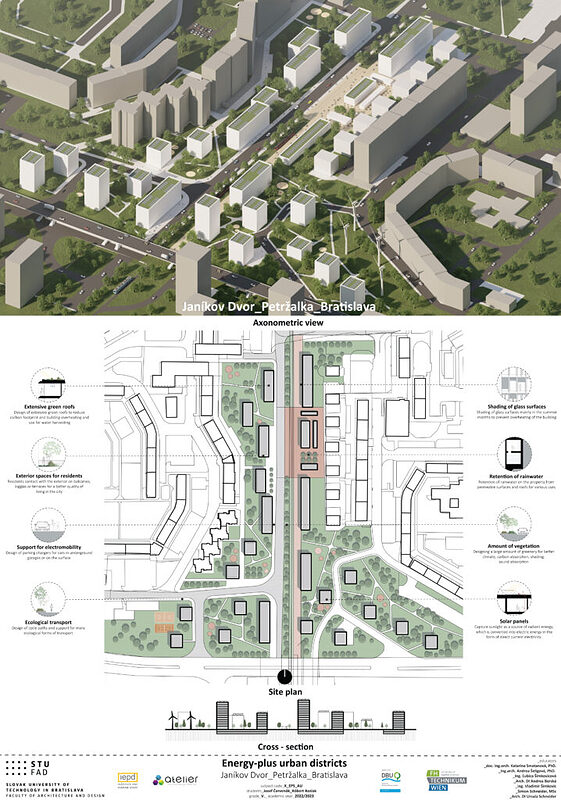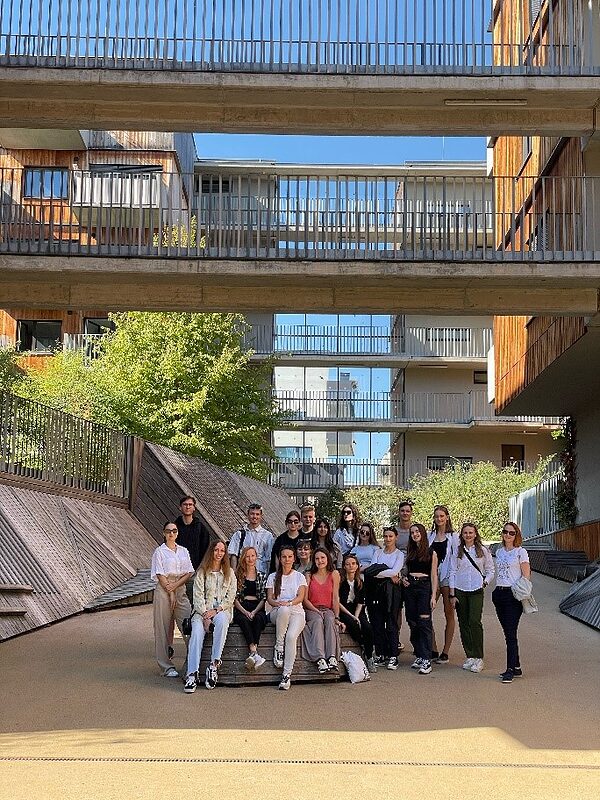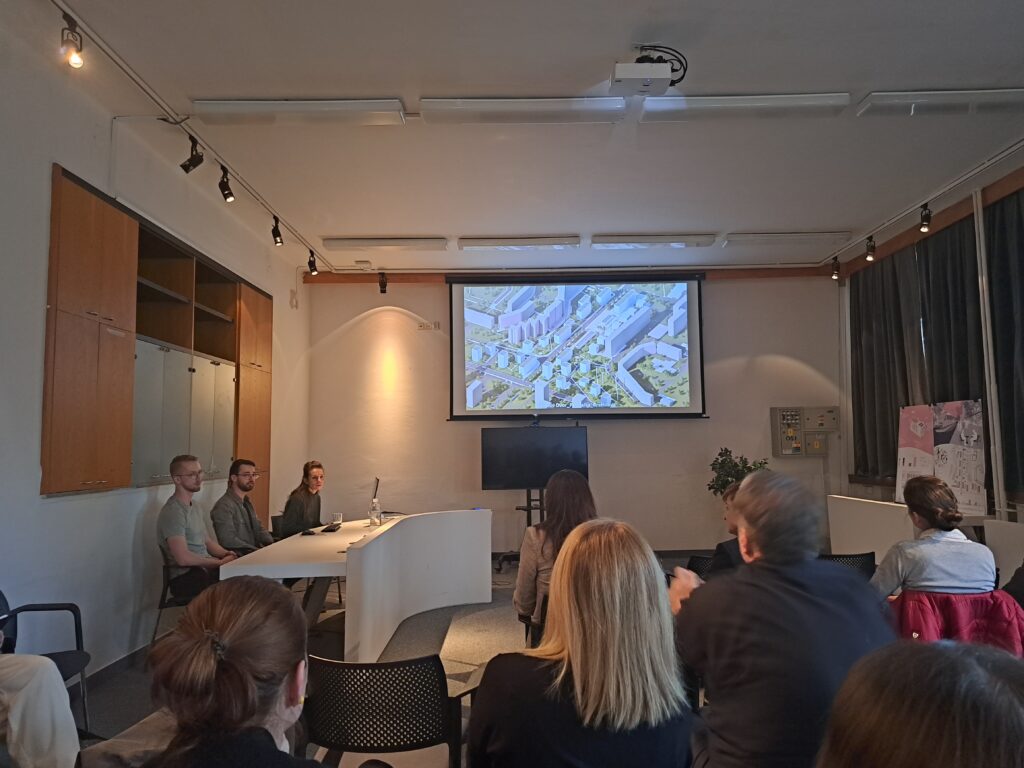Plus-energy districts: development and renewal principles – New elective subject to expand the range of university courses in Slovakia
Keywords: resource efficiency, optimization of closed-loop recycling and recycling options, qualification, digitalization
Subject and objectives of the project
In cooperation with the STU Bratislava, Faculty of Architecture and Design, and the University of Applied Sciences Technikum Wien, the new elective subject “Plus-Energy-Quartiers: Development and Renewal Principles” was developed and, following a successful test run and optimization, anchored in the current curriculum. It teaches the concepts of sustainable and energy-efficient district planning. The elective subject is offered in the winter semester as part of the Bachelor’s and Engineering degree course. It consists of a theoretical part with eight lectures, each in two four-hour blocks, and a practical part with two three-hour blocks and two discussion forums. Twice 30 students took part in the elective in the two winter semesters. They each worked on a student project in six groups – a design for a plus-energy concept for specific locations (Janikov Dvor/Petrzalka and Nove Mesto, both in Bratislava). As part of the lecture series, the theoretical foundations of sustainable and climate-neutral neighborhood development were conveyed along with the architectural principles and contexts. The knowledge acquired was consolidated in the subsequent exercise.
The urgently needed energy transition to achieve climate protection targets in the building sector requires not only optimized individual buildings, but also entire districts where possible. In addition to individual buildings, the scale of the district level is not available at many universities in the required quality to meet the challenges both in municipal planning and in freelance offices.
The development of a new elective subject at the STU Bratislava can therefore make a relevant contribution to teaching the subject of plus-energy districts. For this purpose, principles, considerations and methods based on the passive house and zero-energy building were prepared with the gradual transition from the individual project to the district. In addition to the efficiency targets of the energy-plus district, there are also requirements for the local generation of renewable energy and the creation of energy flexibility. Here, the district approach can realize additional synergies and advantages, such as lower simultaneity, load smoothing through mixed use and district size or a higher self-consumption rate of locally generated energy in the district network. The excursion to the nearby Seestadt Aspern with its already exemplary projects of the timber-hybrid high-rise building or the Seeparq plus-energy building also represented an important practical addition to the integration of the evaluated research projects into teaching.
Work steps:
- Development of the working version of the new elective subject – creation of the concept, learning objectives and methods of the new elective subject, preparation of lectures and exercises and determination of the location on which the student projects of the Plus-Energy Quarter were developed, preparation of documents, preparation of discussion forums, knowledge assessment of students on the subject of Plus-Energy Quarters through questionnaires.
- Testing the working version of the new elective in the winter semester 22/23 – 8 lectures, 2 exercise blocks, 2 discussion forums, supervision and evaluation of 9 student projects, excursion to the location for the student projects and half-day excursion to Seestadt Aspern, number of students participating in the elective: 19.
- Follow-up of the working version of the new elective subject and script creation – evaluation of the methods and lecture topics, follow-up of the excursions, promotion of 3 best student projects (www.iepd.sk, manifest2020.sk, climarchi.net, www.archinfo.sk), creation and translation of the script (SK in EN, EN in SK)
- Testing of the final version of the new elective in winter semester 23/24 including video recordings of the lectures – was carried out in the same way as in winter semester 22/23. Number of participating students: 30, number of student projects: 6. A video recording in English with Slovak subtitles was produced for each lecture.
- Evaluation and finalization of the new elective subject
Innovation and exemplary nature of the project
The elective can also be offered at other universities in Slovakia once it has been successfully included in the curriculum at STU Bratislava. As part of the continuation of the project, the content and structure of the elective will be adapted so that the elective can also be offered in Austria. An innovative aspect of the project is the elective subject “Plus-energy districts: development and renovation principles”, which is not currently included in the curriculum of the Faculty of Architecture at STU Bratislava.
The integration of external experts from the field of research and practice creates a new lecture structure in terms of content, which responds more strongly to the practical reality of architects. The bilingual design (Slovak, English) including the bilingual script and translated video recordings of the lectures supports the integration of all students registered for the course, both of Slovak and international origin.
Special aspects of the project
After completion of the project, it became clear that the didactic materials created are also suitable as study materials for other fields of study, such as those offered at the Faculty of Engineering or the Academy of Fine Arts. Students at various universities in Slovakia have free access to the online version of the materials. The script is presented to architects as part of the three-day seminar School of Sustainable Architecture and Urban Planning.



Funding theme 5: Sustainable neighborhood development
Project implementation:
- University of Applied Sciences Technikum Wien
- Inštitút pre pasívne domy (Passive House Institute), Bratislava, Slovakia
Associated partners:
Places of work: Slovakia and Austria
Funding period: December 2022 to August 2024
Project costs: Total volume: 157,376 euros, funding from DBU: 123,613 euros
DBU-AZ: 38478
Status: 29.04.2025
All images and illustrations: © iEPD